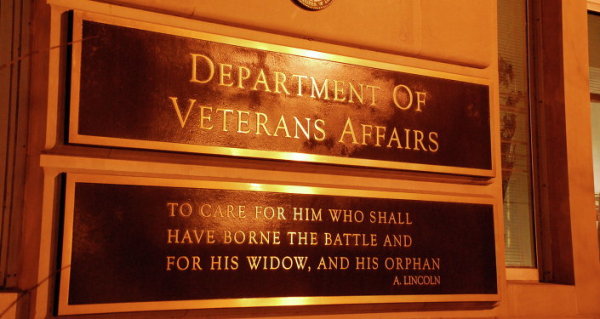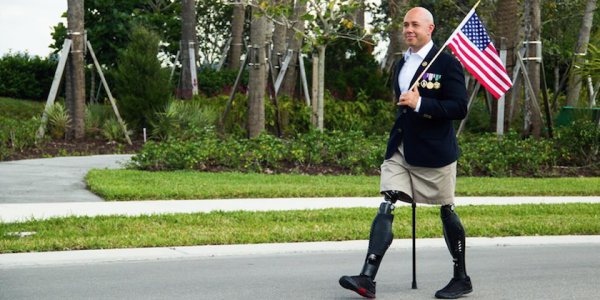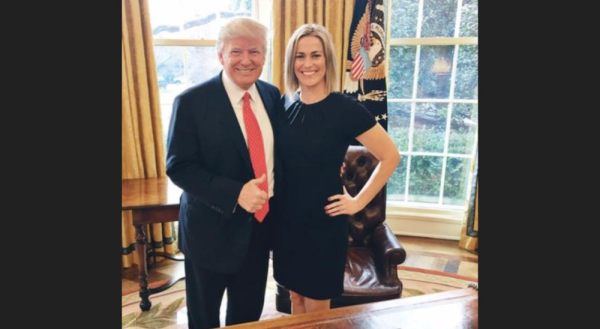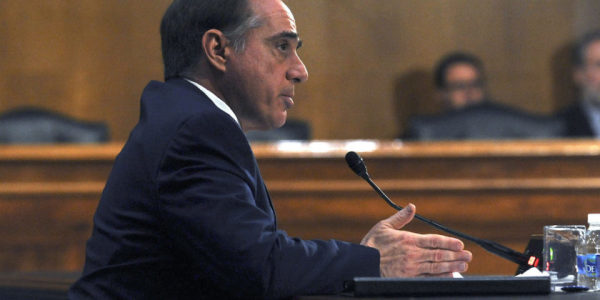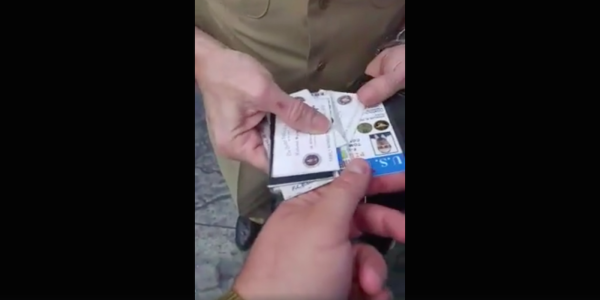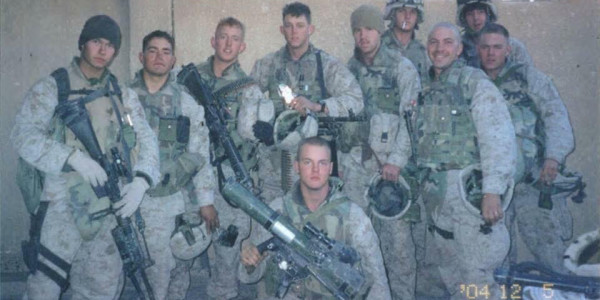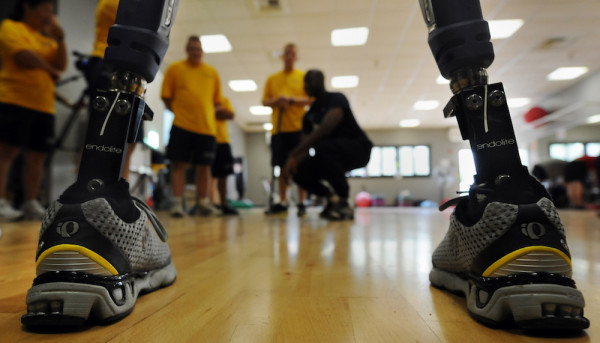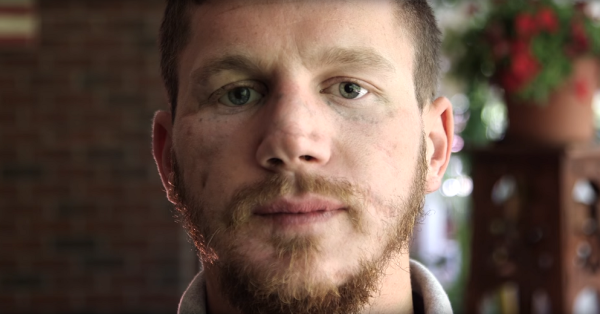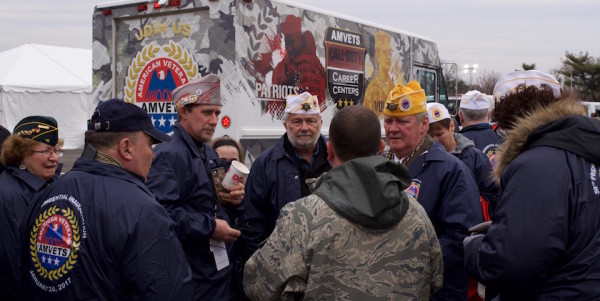When we talk about the Department of Veterans Affairs — positively or negatively — we tend to talk in the abstract. We talk about waitlists without talking about names. We talk about suicide among veterans without talking about faces. We talk about the need to fire VA employees without talking about specific public servants.
A snippet of a phone call recorded Aug. 11 challenges that narrative. The clip shows a combat veteran of Iraq and Afghanistan’s interaction with a seasoned nurse practitioner at a major VA facility. The recording shows a struggle to obtain quality care shared by countless veterans that has been widely reported on, but it also shows something else. It shows an emotional side to that struggle, and how it affects everyone involved.
The veteran on the line is Thomas Brennan. I count Tom as a personal friend. Beyond that, he’s one of the toughest Marines I know. He’s one of those guys who looks tough — burly chested, with sleeve tattoos. But his real grit hides in the details of his past.
He’s a Purple Heart recipient, a former infantry sergeant who twice deployed with 1st Marine Battalion, 8th Marine Regiment; once to Iraq and once to Afghanistan. His life changed forever when he met the wrong end of a rocket-propelled grenade in Afghanistan. The resulting post-traumatic stress and traumatic brain injury ended his career in the Marines, but these injuries haven’t halted his incredible talent and promise. He’s a recent graduate of Columbia University’s renowned school of journalism. As a journalist, he’s written passionately and impactfully about the issues affecting the military and veterans community; including his own brush with suicide; and more recently, in a front-page feature about the Islamic State for the New York Times.
These issues are clearly personal for Brennan, but just how personal was highlighted in a recent call with his local VA clinic. As a result of his traumatic brain injury, Brennan has headaches. In an interview with Task & Purpose, he said his head always hurts on a scale of two or three out of 10. That’s his normal.
“I’ve learned to live with those, I’ve learned to ignore those,” Brennan told Task & Purpose. “It’s just how my head feels since I got blown up.”
When it gets bad, Brennan said, is when his headaches approach a six or a seven on that scale. And then there’s the 10s.
“When I get to the 10, it’s like nothing stops the 10. I lay in bed and I cry, and I can’t even put my head on the pillow because it hurts so bad, but if I lift my head it spreads to my neck and everything hurts,” Brennan said.
Since he returned to his home in Richlands, North Carolina, after graduating from Columbia in the spring, Brennan has been receiving care through the VA Medical Center in Jacksonville, North Carolina. Eastern North Carolina, home to several large military installations, has a massive veteran population. Brennan receives care from a facility that lies just down the road from where he wore the uniform at Marine Corps Base Camp Lejeune.
Yesterday, in the midst of one of his terrible migraines, he called that facility to check on migraine medication he had sought three weeks before, he said. After spending hours on the phone with multiple VA officials, Brennan said his wife, an emergency room nurse, implored him to use her phone and record it. Brennan said he recorded about 25 minutes of audio, and from that he created a one-minute and 27-second video, which he posted to YouTube and shared with Task & Purpose.
The clip shows the very end of Brennan’s three-hour call. It shows him interacting with a nurse practitioner at the Jacksonville VA named Lydia Janning. Brennan said he has interacted with her before and he believes she cares and does her best with the resources she has. In the recording, Janning makes that claim as well. The video shows an emotional side of the struggle veterans face to receive care that is rarely seen by the public. It shows an emotional side to the frustrations VA health care providers experience with the fraught system as well. This side, the perspective of just one of more than 300,000 public servants who work at the VA and struggles to provide care for a war-wrought veteran, is rarer still.
Brennan called the video “The Clinic of Hundreds,” a reference made by Janning on the phone to the hundreds of veterans she sees every day.
The clip begins with the woman apologizing profusely to Brennan. He cuts her off. “What I’m concerned about is tomorrow if I wake up and I can actually drive to come pick up a prescription, can I get something to help it go away while I’m waiting on the prescription to come in the mail?”
He struggles to make it through the sentence. The tears come, as he said they often do when the headaches get this bad. It’s hard to tell if he’s crying from the pain, or at the idea that he may not be able to acquire help.
Janning replies, “Absolutely, absolutely. We can do that.”
“I really would have appreciated that phone call,” Brennan says on the recording.
He told Task & Purpose that when he first met with Janning and arranged for the medication to be delivered by mail, she told him she would call him if anything went wrong. He waited for three weeks and that call never came. He had no idea if the medication would come the next day, or if it had been held up.
“The veterans don’t care about the wait time, we just want to feel like we fucking matter,” Brennan says in the video. “And when you’re sitting at home like this, you don’t feel like you matter to the doctors who are supposed to take care of you.”
Janning offers a soft, “I know.” She sounds empathetic and compassionate, too familiar with those feelings.
Brennan told Task & Purpose that in that moment, he took his pain and frustration out on her, he now says he regrets that.
“You don’t know, you’re not sitting here with the headache right now,” he tells Janning. “You’re not. You don’t know.”
“You’re right, I don’t. But I do know that there are a hundred veterans here every day saying the same thing … and we do the best we can. I will order the medications for you today and if you want to come in tomorrow, that would be fine,” Janning says.
The soft compassion and empathy are gone, replaced by tears.
“Thank you very much, and I’m sorry,” she says before hanging up the phone abruptly, assumably not wanting to break down further on the call.
In text that appears in the video, Brennan addresses the outrage we sometimes hear over veterans access to care and problems with the VA. It’s the sort of outrage that forced former VA Secretary Eric Shinseki to resign last year over secret waitlists at the VA facility in Phoenix, Arizona.
“Be outraged for veterans who rely on an understaffed bureaucracy to manage their care,” the video text reads. “Be even more outraged for the doctors, nurses, and medical staff, who can’t provide for the care they want to give their patients. Veterans aren’t the only people suffering at the VA.”
When Congress returns from its recess, one of the pressing issues it must face surrounds controversial legislation that would increase the ability to fire officials at the VA. That legislation is called the “VA Accountability Act.” The bill has little Democratic support, and the president has pledged to veto it over concerns surrounding employees rights. For veterans like Brennan who rely on the VA for care, VA accountability looks like something else: holding leaders and policy makers accountable for much needed resources and reforms.
“How many more acts and bills and laws do we need before we actually make a difference? Before something actually happens?” Brennan said.
More than a year after a national scandal forced out the VA secretary and spurred pledges to reform, access to care is still deeply flawed. This video shows how veterans and employees alike are frustrated about it.
Of Janning, Brennan told me, “I want to give that fucking woman a hug. I just want to tell her that I know it’s not her fault. I wish she hadn’t hung up the phone.”
Watch the video below.


